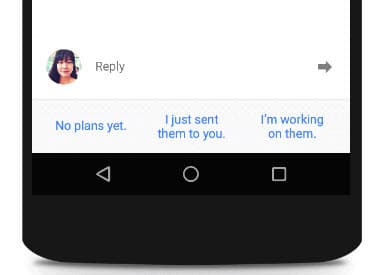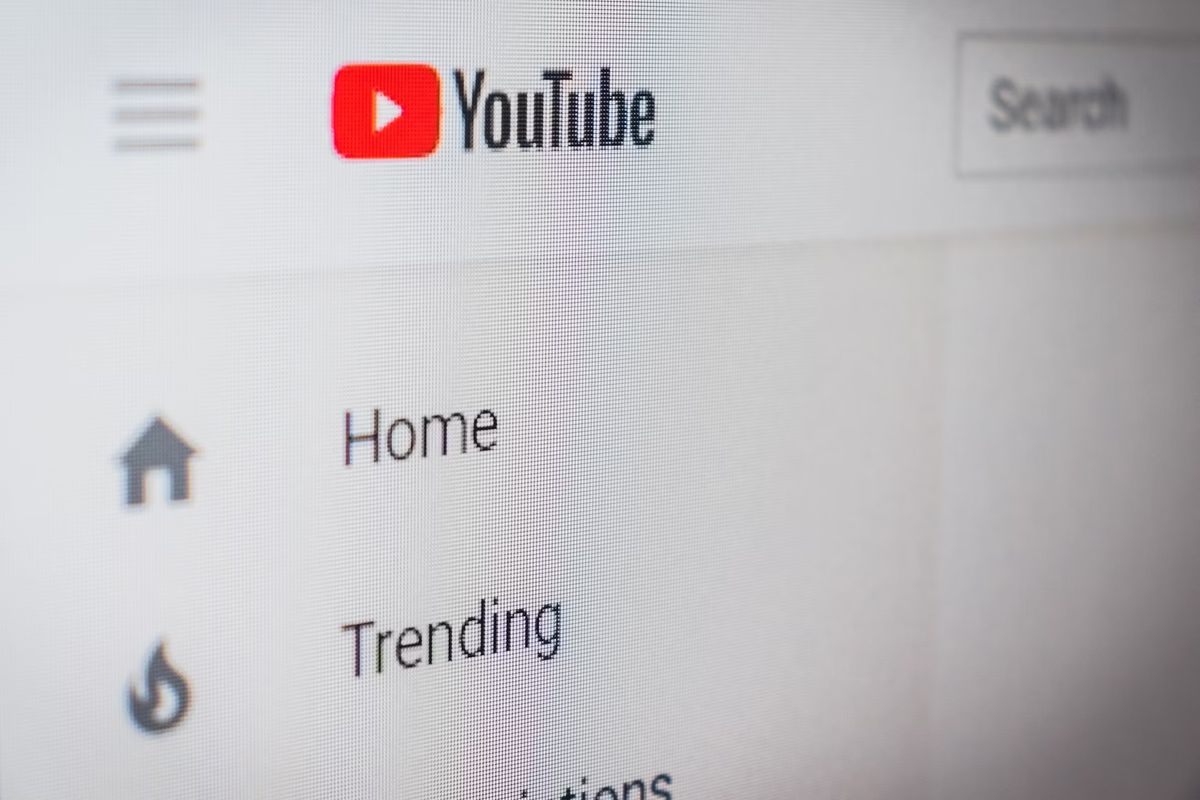Google Inbox will soon predict your replies by analyzing your emails

Google announced a new feature today that it is launching in Inbox by Gmail tomorrow that it calls Smart Reply. The feature is designed to predict replies to display those as options to you when you are responding to emails to improve your workflow further and reduce typing.
Smart Reply has been designed to cut response times and make it less time-consuming to reply to emails in Inbox for Gmail.
The new feature displays up to three suggested responses when you are replying to emails based on the emails you have received in the past.
For instance, if you receive an email that is asking for vacation plans, suggestions may be provided that state that you have not made any plans yet, that you are working on them, or that you have them and sent them with the email or soon.
The responses are basic and while that works well for certain types of emails you receive, may need to be fleshed out more often than not.
There is no requirement to use them at all, but if you do, all you need to do is tap on one of the responses to add them to the email you are about to write.
So how is Inbox coming up with these responses?
According to Google, it uses machine learning to "recognize emails that need responses" and to generate "natural language responses on the fly".
What this means is that these emails get parsed by Google much as they are when the company is detecting spam, picking up travel information or other types of information.
Additional details about the inner workings of Smart Reply are available on the Google Research blog.
Like other sequence-to-sequence models, the Smart Reply System is built on a pair of recurrent neural networks, one used to encode the incoming email and one to predict possible responses. The encoding network consumes the words of the incoming email one at a time, and produces a vector (a list of numbers). This vector, which Geoff Hinton calls a “thought vector,†captures the gist of what is being said without getting hung up on diction -- for example, the vector for "Are you free tomorrow?" should be similar to the vector for "Does tomorrow work for you?" The second network starts from this thought vector and synthesizes a grammatically correct reply one word at a time, like it’s typing it out.
Closing Words
I don't think that Smart Reply is as useful as Google would like it to be. On the desktop, it is more or less useless due to the short nature of responses. On mobile devices, it can be somewhat useful but unless you get lots of emails per day, won't really be that beneficial either considering that it does not take long to type short replies manually instead.
Privacy-conscious users may dislike the idea of the company crawling its emails to generate these responses. To be fair though, that is already happening and the new Smart Reply feature does not change that either way.
Now You: Smart Reply, useful feature or creepy?





















The creepy fact is the localistion. All these “services” could be easily ran on local machines. The Filters in Thunderbird are clever enough to analyze mail-contents and move the mails to the desird folders.
The problem is the average users, who are too stupid to manage a powerful mail-client and to organize own filter-structures. That’s why have all those crap like WhatsApp, Facebook and others.
Another aspect: This Google-system gets f****d if we use encryption.
As long as the users are not able to manage their systems and communication structures, the authorities will do it for them according to their own purposes.
“…dislike the idea of the company crawling its emails to generate these responses”. BINGO!
It’s beyond me why anyone still uses gmail not only for this reason, but a whole laundry list of unsavory behavior. Of course, many of the big name email services are either also on board or heading in that direction. I’ve never used gmail after doing much research on it; had yahoomail for a while years ago but it became so glaringly, pathetically bad (outages, one new added novelty after another bogging down the service, emails disappearing, etc etc) I wrote a series of bad reviews and got rid of it.
After much reading and research I finally settled on the free zoho personal email. No ads, no nonsense, no useless bells and whistles; if one wants extra features these are there but not pushed, prompted, or “recommended”, ad nauseum. All I personally need from an email client is to send/receive emails, receive no spam/ads from affiliates of the company, and have an efficient, clutter-free user experience. Zoho delivered and all those other cluttered ‘TRENDING NOW!’ social experiments can kiss my happy unfettered ass.
@ Tom H –
Amen, Tom. You hit the nail on the head, dead center.
Who’da thought that Big Brother (Orwell 1948) would be a corporation? Orwell envisioned Big Brother as the government. Hopefully, Google will go too far and unleash a tremendous user backlash.
Microsoft may already have done so with it’s aggressive Win 10 “telemetry” BS, though I doubt it. But I will continue to use Win 7 (utilizing Martin’s suggestions to prevent MS from monitoring my activities) until I become proficient in Linux. Then it will be “Goodbye MS, and good riddance!”
I am optimistic however, that over time, as you suggest, most users will wake up and sever all ties from these outfits and their despicable spyware monitoring and data manipulation. Until then, let us wage the good fight and get the word out to as many folks as we can.
Orwell seems rather tame compared to what we are in for.
Hell I’ll bite on this one…
Those I make 75$ an hour spam ads now will do themselves automatically, so when is google sending me my 1% of their profits xD
Creepy, crawly, creepy-crawly. They are mad. One can be intelligent and still mad.
Invasion. They read my mail so why wouldn’t they respond to it? Because my mail is private business, because I don’t want to have a sticky company on my back, because those companies are a pain in the neck, sneaking everywhere and bringing that arrogant “Anything else for your service, Sir?” when caught ferreting about.
That’s the way I feel it. This is why I’ve abandoned G Octopussy for some time, that’s why I’ll never use the Mad’s Company email service, that’s above all why I’ll never use its browser.
Winds of madness, and the worst is to come with the Internet of Things.
I’m getting closer and closer to the idea of blocking Google as far as I can, 1E100.NET PUBLIC IPS included, and caramba on the many sites which would become broken. I’m fed up with Google, with Microsoft, with Amazon, and Facebook, all social crap you name it. Fed up.
+1
Just wait until two (or a billion) Gmail accounts get into a never-ending loop of auto replies .. it’ll be like digital “grey goo”.
… or they start chatting and plotting behind your back
gosh, imagine if it starts using negative references that you made about someone you know in a previous email that you sent to someone else you know to write an automated email to the exact person you made the negative reference about.
User written message to someone they know who is not Josh:
“I hate Josh so much, I think he is a ####!”
Automated Google written message to Josh:
“Hi Josh, the reason I did not message you back that day is because I think you are a ####!”
I had never occurred to me that Skynet would begin in my inbox.
ahh, well that is not creepy at all.
I find it odd that email service providers such as Yahoo now allows it’s users to access their email accounts from other email service providers through the Yahoo email service but yet these same providers have not come together to formulate a unified encryption for their email service.
It boggles the mind, why are emails not encrypted?!
“why are emails not encrypted”
Super short history lesson: email was designed to deliver messages, security way back in the day wasn’t even a concern and wasn’t built into the protocols. By the time it became apparent that security would be a good thing, it was too late – anything that has been added since is really only trying to patch holes, and not succeeding – not mainstream.
There are two “types” of email encryption – one is in TRANSIT (as the emails are zapped around the internet between mail service providers and senders and receivers, the packets are encrypted in transit. Even if you set up your email to use SSL or TLS etc, that is no guarantee that it will be respected by various parties. Email servers are generally designed to FAIL SOFT rather than FAIL HARD and a lot are just not configured correctly. Also, it has been show that even an ISP will strip out the encryption by modifying the packets (I can’t be arsed locating the Ars Technica article, I think it was a Verizon subsidiary, but I think after the uproar it was found to be a human error), and this happens a lot – some nefarious, most due to poor admin/setups. It has been shown recently that while the trend is on an upward slope, it’s still poor reading –> analysis of email (yahoo, gmail and a couple of others) shows that some 40% of emails are still not encrypted in transit (see a very recent wired article – if i get time I’ll dig out some urls)
The other is when users and receivers use compatible plugins/algorithms etc such as PGP and use public+private keys – and they encrypt the CONTENTS – but for most people, this is just way too hard to do.
One thing which isn’t ever encrypted (although it can be done via onion etc, where each hop a layer is peeled off to reveal some metadata, but not all at once, so sender and receiver info is never shared <-simplified version) is the metadata – the headers which say from X to Y etc – as these are required for routing purposes.
Which brings me to the next item. You should read up on guys like Ladar Levison and Dark Mail. They are essentially reinventing email protocols to fully encrypt all parts of email – metadata, contents, and in transit – with tools that will plug in seamlessly into today's mail servers – and make it easy for end users.
http://www.zdnet.com/article/dark-mail-debut-to-open-door-for-lavabit-return-ladar-levison/
TL;DR: Because email was never designed with security in mind, current setups are too mainstream to change (billions of email users and clients etc that can't handle changes), and it's too hard currently (try getting your mom to use PGP). And you can add to that the likes of google and yahoo and outlook.com don't want to hide everything – because you're the product.
Thank you for the in-depth explanation. In the same way that viruses and unauthorised intrusions where mitigated against with anti-virus programs and firewalls back in the day, I sure hope that developers everywhere begin to place more consideration into encrypting emails and other forms of communication and transmission in the light of the recent world wide intelligence agency spying scandal on all and sundry that has been taking place over the last decade and a half, it seems to be the only way forward, it is either that or we will have to descend even deeper into our new found distopia.
Don’t find it creepy, more like saddening. It reminds me of how little needs to be said. Bring on the AI! So trivial..
And that’s why I use Yahoo mail for sensitive stuff. Yahoo’s too dumb to do this kind of tech.
Hate to tell you .. yahoo analyses your email content by the agreement you clicked too :(
“[…]reduce typing”
How lazy did people become lately if they would benefit from such a “feature” ?
Er, some of us can’t type. I try never to touch the keyboard, myself.
No worries, that shit will be advertised very well by bunch of useful idiots and fanboys; not mention that sometime in future it will be most likely an integral part of Gmail service.
Reminds me strongly of the movie Her. Really recommend getting past the basic premise and watching it.
I wonder how close their algorithm will come to predicting how many times I tell it to f%@^ off in teh body of my reply emails.
useful feature or creepy
Not creepy in that they have been analysing every word in every email. Useful? Nope; given that I don’t use gmail but for emails that are likely to be spam/garbage anyhow :)
Creepy.
I don’t even like to send emails to people with gmail addresses. I assume Google reads my mail to them before they do, then stores the topic, and my return address, forever.
In the near future, blog comments like this one will also be written for me by Google. Based on their knowledge of my personal viewpoints, of course.
As the next step, it will no longer be necessary for me to read any mails or blog posts at all anymore. All my incoming mails will be auto-replied by Google, while from the blogs that I used to read, Google will now simply auto-select those few online posts that I would have commented on, and then Google will fill in some appropriate comments on my behalf.
From then on, Google will of course also auto-fill my calendar with all the appointments that it generates for me, based on their benevolent all-encompassing insight in my emails, messages, calls and the free gaps in my schedule. Google will of course also compose and maintain my Facebook profile for me — and much, more more. Google will even tell me at what time I need to snap what photo!
In short, I won’t have to waste any time anymore getting in touch with anyone, or even browsing the Web: finally, Google will take care of running my entire life smoothly and without any effort!
Oh great Google, liberated from all my chores, I want to thank you from the bottom of my heart. One question left: what shall I do with all my free time now? Oh wait, no doubt you already have some answer to that one too.
==============
This comment was auto-generated by GLIB: Google’s Liberating Intelligent Blogcommenter (still in beta)
==============
Sounds pretty creepy. I have a book on my to-read list called “Auto (Auto Series)” by David Wailing. It’s based in 2022 where everyone uses an ‘auto’, a sophisticated digital personal assistant which acts on your behalf. Apparently they can go wrong or something, I guess I shall find out soon… It seems to get good reviews, so I’m looking forward to it.
And if you’ve seen the “Black Mirror” series by Charlie Brooker (free on Ch4 on-Demand for UK residents) the “Be Right Back” episode that touches on this is pretty creepy too. I won’t say too much as it will spoil it for anyone who hasn’t seen it, but like you said, theoretically “you” could correspond with relatives who live in the future. Certainly thought provoking.
That was covered thoroughly and humorously by Frederick Pohl in his Heechee book series (Gateway, Beyond the Blue Event Horizon, etc.), with the holographic “avatars” not only handling correspondence, but also making contacting people (or their avatars) for appointments or queries, and even engaging the people in conversation, e.g. an “Einstein” avatar to discuss technical questions, etc.
All it takes is a little more computing power and software…. I’m sure the engineers at Google have read the series…
We correspond with Shakespeare without any assistance when with the author’s writings. Of course it’s not a dialog (though it may seem as if it was, sometimes), but it’s authentic. Let us try to imagine how we would today dialog with Shakespeare if he had decided to explore eternity by the means of an insanity such as what is proposed to us nowadays or tomorrow? Authenticity is the master-word. We are living in an era of fake.
Eventually, you don’t even need to exist (anymore) for your online life to go on. You could correspond with relatives who live in the year 2984 this way.